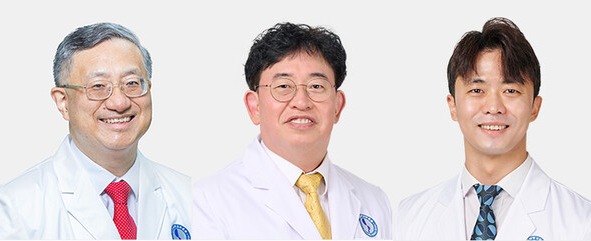There has been no clear standard for the optimal timing of starting chemotherapy after stomach cancer surgery. However, a recent study has found that starting within six weeks can significantly increase survival rates, drawing considerable attention.
Professor Choi Jin-hyuk of the Department of Hematology and Oncology at Ajou University Hospital, along with Professors Lee Hyun-woo and Kim Tae-hwan, announced the results of their study on Monday on the optimal timing for adjuvant chemotherapy after stomach cancer surgery.
This study, a large-scale retrospective cohort analysis of 19,140 patients with stomach cancer in Korea, is likely to provide important evidence for establishing practical clinical guidelines for stomach cancer treatment.

Stomach cancer is a representative cancer with a high incidence rate in East Asian countries, including Korea. In particular, for patients with stage 2 to 3 stomach cancer, adjuvant chemotherapy after curative surgery is recommended as standard treatment to reduce the recurrence rate. However, until now, there has been no clear standard for determining the optimal timing for initiating chemotherapy after surgery.
To address this, Professor Choi's team analyzed data from 19,140 gastric cancer patients who received standard adjuvant chemotherapy with S-1 (S-1) or CAPOX (capecitabine and oxaliplatin combination therapy) between 2014 and 2018, utilizing national data from the Health Insurance Review and Assessment Service.
The study participants were divided into three groups based on the timing of adjuvant chemotherapy initiation after surgery: within six weeks (12,843 patients); six to eight weeks (5,386 patients); and over eight weeks to 16 weeks (911 patients). The disease-free survival rates and overall survival rates were then compared across these groups. The results clearly demonstrated significant differences in survival rates depending on the timing of treatment initiation.
The group that started adjuvant chemotherapy within six weeks showed the highest five-year disease-free survival rate (63 percent) and overall survival rate (72 percent), while the six to eight week group had 57 percent and 66 percent, respectively, and the group that started treatment after eight weeks showed a gradual decrease in survival rates, with 47 percent and 53 percent, respectively.
These results were consistent across all types of chemotherapy used, and statistically significant differences were confirmed in multivariate analysis and propensity score matching after adjusting for confounding variables, including age and comorbidities. This suggests that the timing of adjuvant chemotherapy also influences patient prognosis.
“In the clinical setting, where there was a lack of clear evidence regarding the timing of adjuvant chemotherapy after gastric cancer surgery, this study is expected to provide practical guidelines for determining the optimal treatment timing,” Professor Choi said.
Professor Kim said, “Efforts to coordinate patient recovery and treatment schedules to enable adjuvant chemotherapy within six weeks after surgery are crucial for reducing gastric cancer recurrence and improving survival rates.”
The results of this study were published in the June issue of the international cancer journal, The Oncologist, under the title, “Analysis of outcomes according to start timing of adjuvant chemotherapy in patients with gastric cancer: a retrospective nationwide cohort study.”
Related articles
- BeOne bets Tevimbra will beat rivals to PD-1 reimbursement in Korea
- Colonoscopy included in revised national colorectal cancer screening guidlines
- Astellas Korea renews bid to reimburse targeted gastric cancer drug Vyloy
- [Contribution] Tailored lymph node dissection is reshaping stomach cancer surgery
- Koreans, who rank 3rd globally in stomach cancer incidence, must take regular screenings

